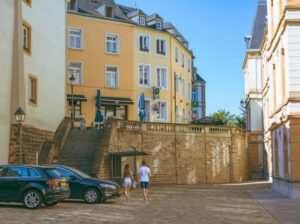Luxembourg, one of Europe’s most prominent financial centers, offers an investor visa program officially known as the “residence permit for investors.”
This program allows third-country nationals to gain residency by committing significant capital to the country’s economy. Unlike other European golden visas, Luxembourg’s framework is tightly focused on direct business, fund, or banking investment, with no real estate option.
However, due to unpopularity, the Luxembourg government is considering putting a stop to the program.
This article explains how the Luxembourg investor visa works, what the minimum investment requirements are, the process of applying, how it compares with other EU programs, and whether it leads to permanent residency or citizenship.
It also highlights the recent government review that has put the program’s future into question. Importantly, the investor visa is still technically in force, meaning applications are accepted under existing law though applicants should be aware of the current uncertainty.
My contact details are hello@adamfayed.com and WhatsApp +44-7393-450-837 if you have any questions.
The information in this article is for general guidance only. It does not constitute financial, legal, or tax advice, and is not a recommendation or solicitation to invest. Some facts may have changed since the time of writing.

Recent Updates to the Luxembourg Investor Visa
In early 2025, Luxembourg’s Ministry of Home Affairs confirmed that it is reviewing the utility of the investor residence permit and considering whether to terminate the program altogether.
This announcement followed broader EU debates about the role of investment-based residence schemes and their potential risks, including concerns about money laundering, reputation, and economic necessity.
While no repeal law has been passed and the investor visa remains legally available, the review signals a policy shift.
Investors can still apply under the existing framework, but they face higher uncertainty compared to programs in other jurisdictions.
The core requirements such as minimum thresholds of €500,000 for company investment, €3 million in a Luxembourg-based fund structure, or €20 million in a bank deposit have not changed. However, the government may suspend or amend these options depending on the outcome of the review.
For prospective applicants, this means timing is critical. Those entering the process today must not only meet the stringent financial thresholds but also accept the possibility that the program could be altered or withdrawn during or after their application.
What is the Luxembourg Investor Visa Program?
The Luxembourg investor visa or residence permit for investors is designed for high-net-worth individuals who want to establish residency in the country by making a substantial financial contribution.
Unlike golden visa schemes in other European states, Luxembourg’s program is deliberately narrow. It prioritizes genuine economic activity, such as creating or supporting local companies, funding investment structures, or maintaining significant bank deposits within the country’s financial system.
The program was introduced in 2017 as part of broader efforts to strengthen Luxembourg’s role as a hub for finance and international investment.
Applicants must first obtain ministerial approval for their chosen investment, then secure a temporary authorization to stay, and finally apply for the residence permit after arriving in Luxembourg.
The permit is generally valid for up to three years and is renewable if all conditions remain satisfied.
How to Get an Investor Visa in Luxembourg
Applying for Luxembourg’s investor visa is a multi-step process that requires both ministerial approval and strict compliance with administrative rules:
- Choose an eligible investment option. Investors must decide whether to commit at least €500,000 to an existing company, €500,000 to create a new company with jobs, €3 million to a Luxembourg-based investment structure, or €20 million as a bank deposit.
- Secure approval from the authorities. Applications for company-based investments are reviewed by the Ministry of the Economy, while fund and banking investments require approval from the Ministry of Finance. The authorities assess both the legality and the economic impact of the investment.
- Apply for a temporary authorization to stay. Once the investment plan is approved, the applicant requests authorization from the Immigration Directorate before entering Luxembourg.
- Complete local formalities. Upon arrival, the investor must file a declaration of arrival, undergo a medical examination, and submit their residence permit application.
- Maintain the investment. To retain residency, the qualifying investment must be held for at least five years, and conditions such as job creation or company stability must be fulfilled.
This process makes Luxembourg’s program one of the most demanding in Europe, as it requires both upfront capital and ongoing compliance.
It is best suited for investors who already have business or financial interests in the country, rather than those seeking a low-maintenance residency option.
Luxembourg Investor Visa Requirements
Applicants for Luxembourg’s investor visa must meet both financial and personal requirements. On the financial side, they must present a detailed investment plan that aligns with one of the approved categories, along with proof of funds and documentation verifying the origin of their wealth.
The investment must be maintained for at least five years, and company-related investments are monitored to ensure jobs are created or retained as promised.
Personal requirements include a valid passport, a clean criminal record, proof of suitable health insurance, and undergoing a medical check after arrival. Applicants must also file an arrival declaration with the local administration.
The application fee is currently €80, and the residence permit is initially valid for up to three years. Renewal depends on whether the investment and compliance obligations remain in place.
These requirements reflect Luxembourg’s approach of ensuring that investors contribute to the local economy while meeting strict due diligence standards.
The program is not designed for passive residency but for investors who can demonstrate a legitimate and sustained economic role in the country.
What is the minimum investment required for Luxembourg Investor Visa?
Luxembourg’s investor visa sets some of the highest thresholds in Europe, reflecting the country’s focus on serious investors rather than mass-market residency programs. The minimum investment starts at €500,000 and depends on the chosen route:
- €500,000 into an existing Luxembourg company, provided the company maintains both the investment and its employment levels for at least five years.
- €500,000 to create a new Luxembourg company, with the requirement that at least five jobs are created within three years, in collaboration with Luxembourg’s employment agency (ADEM).
- €3 million into a Luxembourg-based management or investment structure with adequate economic substance.
- €20 million as a bank deposit with a Luxembourg financial institution, to be maintained for five years.
Real estate purchases do not qualify under any route, setting Luxembourg apart from popular golden visa countries such as Portugal, Spain, and Greece.
These high thresholds are a deliberate choice, ensuring that only investors with substantial and long-term commitments are admitted.
How is Luxembourg Investor Visa different from other EU Golden Visas?
Luxembourg’s investor visa stands out in Europe because of its high thresholds and narrow focus. Most golden visa programs such as those in Portugal, Spain, and Greece allow real estate purchases as a qualifying route, often starting at €250,000–€500,000.

Luxembourg deliberately excludes real estate, emphasizing business activity, structured investment, or bank deposits instead.
The minimum investment levels are also far higher. For example, the €20 million bank deposit option is unmatched elsewhere in the EU. Similarly, the €3 million requirement for fund structures is significantly more restrictive than comparable schemes.
These design choices make the program less accessible to mass-market investors but more aligned with Luxembourg’s position as a global financial center.
Another difference is the program’s due diligence standards. Applicants must undergo ministerial approval before investing, and ongoing monitoring ensures that job creation and economic contributions are delivered as promised.
This results in a program with strong credibility but limited appeal for those seeking a quick or low-maintenance path to residency.
Does the Investor Visa Lead to Permanent Residency in Luxembourg?
The Luxembourg investor visa does not provide automatic permanent residency, but it does offer a pathway.
The residence permit for investors is valid for up to three years and renewable if the investment and requirements are still met.
After five years of continuous lawful residence, investors become eligible for long-term EU resident status, which grants many of the same rights as permanent residency.
Beyond this, investors can apply for Luxembourgish citizenship after five years, provided they meet integration conditions such as demonstrating language proficiency and passing a civic test.
This timeline is relatively short compared to other EU countries, but it requires sustained compliance with the program and genuine residence in Luxembourg.
In practice, the program is best viewed as a route to EU long-term residency and, eventually, naturalization rather than a shortcut. Investors should plan for a multiyear commitment both in capital and in time spent in the country.
Why Invest in Luxembourg?
Luxembourg offers advantages that go well beyond the investor visa itself. The country is one of the most stable economies in the European Union, holding a consistent AAA credit rating and maintaining strong GDP growth relative to its size.
As a hub for banking and asset management, it has one of the world’s largest investment fund industries, second only to the United States.
For investors, this means access to a sophisticated financial ecosystem, clear legal protections, and a highly skilled multilingual workforce.
Luxembourg’s central location in Europe also makes it an ideal base for cross-border operations, with direct links to major markets such as France, Germany, and Belgium.
In addition, the country offers competitive holding company regimes and favorable tax treatment for certain types of investment vehicles, making it a practical choice for structuring international businesses.
While the investor visa may be under review, Luxembourg remains an attractive destination for those who want to anchor themselves in one of Europe’s most respected financial centers.
The program reflects the country’s strategy: attract fewer but higher-quality investors who can contribute meaningfully to the national economy.
Pained by financial indecision?

Adam is an internationally recognised author on financial matters with over 830million answer views on Quora, a widely sold book on Amazon, and a contributor on Forbes.



